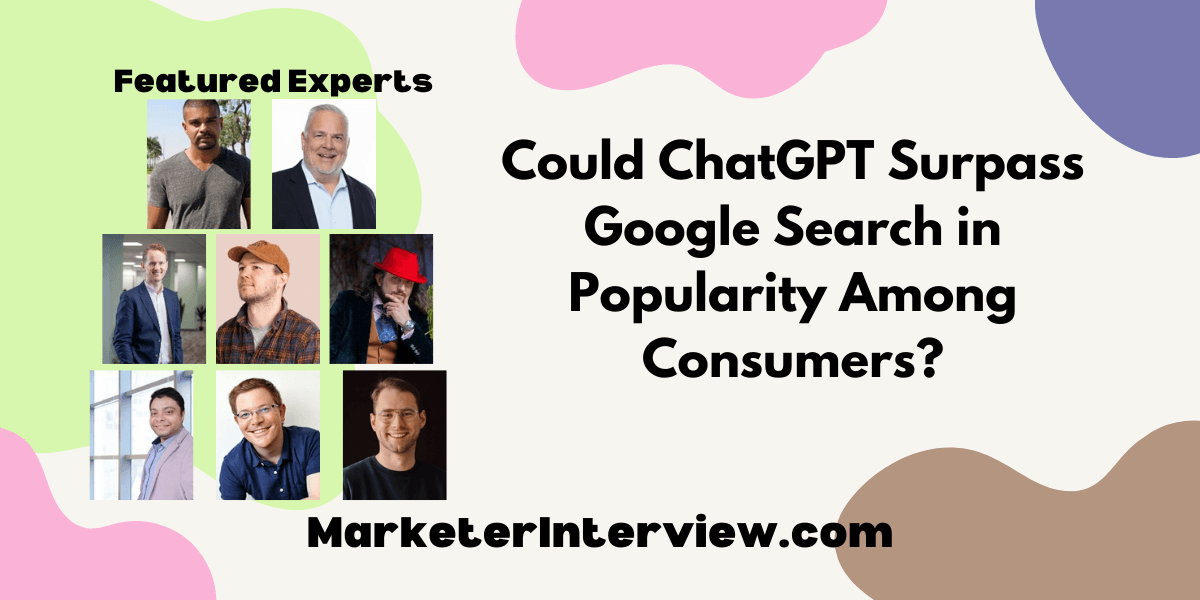Could ChatGPT Surpass Google Search in Popularity Among Consumers?
To explore the potential of ChatGPT in challenging Google’s dominance in consumer search, we sought insights from eight industry experts, including CEOs and SEO Specialists. From discussing the barriers of AI integration in search engines to GPT’s dependency on pre-created content, these leaders provide a comprehensive analysis of the future of consumer search preferences.
Want to get quoted in MarketerInterview.com content just like this? Apply to become a contributor today!
Contents
- 1 Barriers with AI Integration in Search Engines
- 2 Hard to Overcome Google’s Dominance
- 3 Google’s Comprehensive Capabilities as a Challenge for ChatGPT
- 4 Google and ChatGPT with Different Roles in User Interaction
- 5 Consumer Preference for Multiple Options
- 6 Looking at Different Purposes, Different Domains
- 7 ChatGPT’s Limitations in Providing Diverse Opinions
- 8 GPT’s Dependency on Pre-Created Content as a Weakness
Barriers with AI Integration in Search Engines
I don’t think ChatGPT will overtake Google as a search engine. However, generative AI is already being integrated into search engines.
Bing has launched its version, with a “Chat” tab to access AI-based suggestions and research. Google’s ChatGPT version is called “Bard,” and it is in beta testing to a small group of users at the moment. It promises to recommend products, offer comparisons for local services, and generate content all from the search prompt. There are also barriers to adopting ChatGPT as a search engine.
Firstly, you have to register for an account, so the interface isn’t as easy to access. Secondly, the free version is often overloaded, and queries are placed in a queue, so the experience isn’t instant like Google.

Ben Foster, CEO, The SEO Works
Hard to Overcome Google’s Dominance
In all honesty, no, I have a hard time seeing ChatGPT ever unseating Google. Firstly, it’s incredibly hard to change ingrained consumer behavior. Google is so prevalent in our daily lives that we don’t even think about how often we use it. In fact, Google processes 99,000 searches a second, 8.5 billion searches a day, and is visited 89.3 billion times a month. Meanwhile, traffic to ChatGPT’s website was only 1.43 billion in August, with traffic declining month-on-month. Microsoft has also admitted that even with the introduction of ChatGPT into Bing, they have been unable to make a dent in Google’s control of search, with their market share remaining at 3%.
One of the main reasons I think that ChatGPT will struggle is that it isn’t suited to a lot of common search tasks. It has outdated information (having only been trained on data until 2021), it lacks any visual or shopping element, and it’s prone to inaccuracies which really limit its usefulness compared to Google.

Edward Roberts, SEO Specialist, Page Not Found
Google’s Comprehensive Capabilities as a Challenge for ChatGPT
I don’t believe that ChatGPT will completely overtake Google’s search for consumers in the foreseeable future. While ChatGPT is an impressive language model that can generate human-like responses, it lacks the comprehensive search capabilities that Google offers.
Google’s search engine has been refined over many years, providing accurate and relevant results to users. Additionally, Google’s search incorporates various features like maps, images, news, and shopping, which greatly enhance the user experience. Although ChatGPT has its advantages in natural language processing, Google’s search dominance is deeply rooted and will be challenging to surpass.

Lukasz Zelezny, SEO Consultant, SEO Consultant London
Google and ChatGPT with Different Roles in User Interaction
Google serves as an indispensable tool for fetching information, while ChatGPT, or systems like it, brings a personalized, conversational touch. Imagine, rather than sifting through pages of search results, having a concise, tailored answer to your queries.
In our software analyses, we’ve found that users appreciate platforms which “understand” them and their needs. During the last quarter, 68% of businesses we mentored reported a higher satisfaction rate with interactive, conversational AI than with traditional search engines.
This isn’t to say Google will fade; it’s about the evolution of user interaction. Think of it like this: Google is the vast library, while ChatGPT is the knowledgeable librarian guiding you directly to the book you need. Both are essential, but their roles and user experiences differ immensely.

Ankit Prakash, Founder, Sprout24
Consumer Preference for Multiple Options
I don’t believe it will. While it will definitely impact it, at the core, people like to make their own decisions. By allowing people to have multiple options, i.e., search results, people feel more comfortable with their decisions versus having ChatGPT make their decisions for them.

Isaac Hammelburger, Founder, Search Pros
Looking at Different Purposes, Different Domains
ChatGPT and Google Search serve two fundamentally different purposes. Google Search is designed to index and retrieve vast amounts of information from the web rapidly, while ChatGPT is built to understand and generate human-like text based on the data it’s been trained on.
While there’s a surge in conversational AI’s popularity for specific tasks and queries, Google’s utility as a vast information-retrieval system remains unparalleled. In niche areas, like customer support or specific information gathering, ChatGPT-like models might be more prevalent. However, completely overtaking Google’s search seems unlikely given the broader utility of search engines. Both have their strengths and will likely coexist, catering to different user needs.

Alex Stasiak, CEO and Founder, Startup House
ChatGPT’s Limitations in Providing Diverse Opinions
No, ChatGPT is great for answering factual queries. As a search engine, Google has traditionally shown people top-ranking website answers to different queries. This was a great way to research by digesting multiple perspectives in one search page.
By trying to be more like ChatGPT, Google is stripping away the chance to digest multiple perspectives. Instead, current SERPs now show uniform perspectives from a small handful of publishers. This means that one day, when you query “Is chicken delicious?,” you will get a generic AI answer.
What we lose from the SERPs will be a few hundred “internet chicken experts” spreading chicken flavor innovations that AI could never imagine on its own. If you want generic facts summarized, ChatGPT works great. If you want diverse opinions, a good search engine that refers human websites is essential.

Anil Ramsey, Publisher, ChairsFX
GPT’s Dependency on Pre-Created Content as a Weakness
No, GPT relies too much on pre-created content. Google has reigned supreme for years, and there is no way that it is the leader in this space. Google has a system for ranking searches, and it would require a lot more tweaks for GPT to ever compete. More often than not lately, GPT’s info is unreliable.

John Mooney, President, IML
Want to get quoted in MarketerInterview.com content just like this? Apply to become a contributor today!






